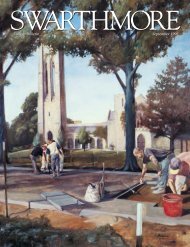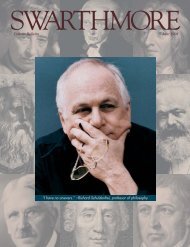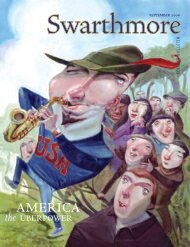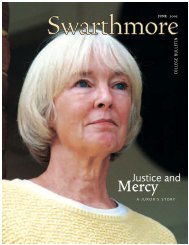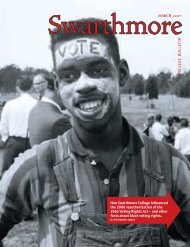Vietnam
Swarthmore College Bulletin (June 2006) - ITS
Swarthmore College Bulletin (June 2006) - ITS
- No tags were found...
Create successful ePaper yourself
Turn your PDF publications into a flip-book with our unique Google optimized e-Paper software.
Q + AStreetwiseMARSHALL CURRY ’92 MOVES FROM FLEDGLING FILMMAKERTO ACADEMY AWARD NOMINEE.By Lewis RicePhotograph by Eleftherios KostansIt’s just like old times for Marshall Curry. He’s driving on thestreets of downtown Newark, N.J., calling a “mole” from thecampaign of mayoral candidate Cory Booker to get the latestnews on the upcoming election. He learns that Sharpe James, thecity’s longtime mayor, will be listed in the first position on a ballotfor an election he may or may not run in. Curry closes his cell phoneand talks of the excitement building around the possible rematch,which could show whether the city has changed since Booker lost toJames in a bruising battle 4 years ago.Certainly, much has changed for Curry since he roamed thesestreets as a fledgling filmmaker who captured the intrigue and chicaneryof the last campaign. He garnered an Academy Award nominationfor Street Fight, the documentary he directed, produced, photographed,wrote, and edited. The film chronicles a political racebetween two African American men of different generations andstyles, in which issues of race and class come to the fore and oldstylemachine politics help propel James to victory.Curry began the project after his brother, who raises money forDemocratic candidates, told him about Booker, a charismatic Stanfordand Yale Law graduate in his 30s whom some have comparedwith Barack Obama—the popular young African American senatorfrom Illinois. He met Booker and saw the potential of a film aboutthe match-up with James.Curry, however, wasn’t the most obvious person to make such afilm. After college, he taught, worked in public radio, and later wrotescripts and learned how to structure and edit stories. But he couldn’timagine becoming a professional filmmaker.“It always just seemed like a dream,” he says. “It was like being arock star or something. It just wasn’t something you do.”Armed with a Sony PD-150 camera and usually alone, Currydecided to make the dream a reality after Booker agreed to give himcomplete access to his campaign. James, on the other hand, suspectedCurry of being a Booker booster and directed city police to stophim from filming the mayor’s public events. “When I was shut outby Sharpe, I thought that ruined the movie,” Curry says. Instead,while editing 200 hours of footage, Curry realized that he hadunwittingly become a part of the story—his treatment an illustrationof the bare-knuckle mayoral campaign.Curry wasn’t the only target. The film depicts city workers threateningcode violations against businesses that sport Booker signs. Inaddition, it zeroes in on James campaign tactics to portray Booker asa carpetbagger (he was raised in a New Jersey suburb); a Republican(Booker, like James, ran as a Democrat in the nonpartisan election);and even not authentically black.With a cut of the movie he edited on a Macintosh computer,Curry pitched the film to PBS, which aired it and provided money tocomplete the final version. A brief run at Landmark Theatres madethe film eligible for Academy Award consideration, although he says,“It seemed like a crazy waste of time and effort to try to qualify for amovie I made in my apartment.” He jokesthat the paparazzi changed their film whenhe and his wife walked the red carpet outsidethe awards ceremony. He also facedhis toughest challenge yet—going upagainst the blockbuster hit movie March ofthe Penguins for best documentary: “Someonesaid to me, ‘You think Sharpe Jameswas tough; just wait until you take on thepenguins.’”The birds won the Oscar, but Curry’snomination gained a wider release forStreet Fight, which attracted uniformly positivereviews. Some have complained, however,that the film presents a one-sidedview of the campaign.Curry counters that it reflects what hesaw and experienced while he was inNewark. “People who are upset with theportrayal of Sharpe James should be upsetwith Sharpe James and not the film,” hesays. “My goal was to make it accuratemore than to make it balanced.” Curry sayshe went into the project with admirationfor the legendary local politician; in thefilm, he credits James for bringing economicdevelopment to Newark. Likewise, heincluded scenes that Booker didn’t care for.But in the aftermath, Curry now says, “Ilike Cory and don’t like Sharpe James.”For the mayor, the feeling seems mutual.According to Curry, James released a letterthe day after Street Fight aired on PBSlast year, saying the film was comparable with one about the Holocaustmade by Adolf Hitler. Because of his history with the mayor,Curry expected less than red-carpet treatment in Newark. He hadn’treturned to the city since he completed the film. When I picked himup in his Brooklyn apartment for the trip to revisit Newark in lateMarch, his wife, Elizabeth Martin, told him to be careful and makesure that the DVD package of Street Fight couldn’t be seen in the car.Curry reveals that he moved the crib of their baby, Jane, away fromthe window of their ground-floor apartment in light of the harassmentfrom the James camp. At one point in the film, a police officerdemands Curry’s identification and notes his home address.Yet, on the streets of Newark, the only repercussion from the filmcomes in the form of a hug, when Curry greets the counsel from theprevious Booker campaign in a downtown diner. We stop outsideBrick Towers, the public housing complex that Booker—who worksas an attorney in Newark—calls home in solidarity with the low-22 : swarthmore college bulletin



